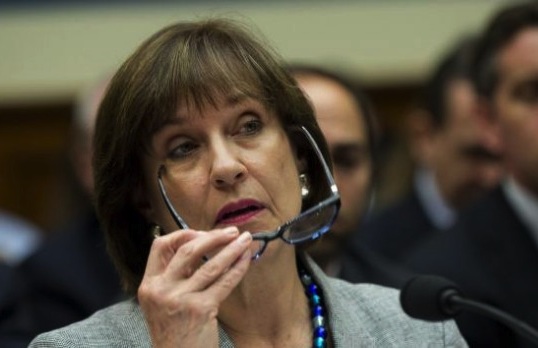Former IRS official Lois Lerner said she warned her colleagues to be careful about what they write in emails amid congressional inquiries, according to new emails released by House Oversight Republicans.
She also asked whether the IRS’s internal messaging system could be searched, in the same email to an IRS colleague. It was sent April 9, 2013, less than two weeks after the IRS inspector general that unearthed the tea party targeting practice shared a draft report with the agency.
“I was cautioning folks about email and how we have had several occasions where Congress has asked for emails and there has been an electronic search for responsive emails — so we need to be cautious about what we say in emails,” she wrote to Maria Hooke, the director of business systems planning for the tax-exempt division. “Someone asked if OCS conversations were also searchable — I don’t know. … Do you know?”
The emails are the latest fodder released by Republicans in their case against Lerner, who led the IRS tax-exempt unit that singled out tea party groups for added scrutiny. The practice was blasted by the inspector general last year, leading to a major shakeup at the tax agency.
Lerner’s lost emails have revived the year-plus-long controversy, though Democrats say Republicans are on a witch hunt to find an elusive tie to the White House.
OCS, the acronym in the email, is the agency’s internal communication system, panel staff said — like instant messaging.
The email did not mention the investigation then being conducted by the Treasury Inspector General for Tax Administration. It was sent a month before Lerner broke the news of the tea party targeting at a law conference, not mentioning what congressional inquiries she was concerned about.
Republicans latched onto the correspondence to accuse Lerner of trying to hide IRS information from investigators and also chided the IRS for only now telling the panel that there is a whole other method in which agents could communicate.
“For her to be worried right on the heels of this draft IG report that Congress may search her instant messages. … That is very troubling,” said Rep. Ron DeSantis (R-Fla.)
Lerner’s lawyer did not immediately respond to requests for comment.
IRS Commissioner John Koskinen, speaking at the hearing on improper government payments, said he was not there to defend Lerner, who has asserted her Fifth Amendment right not to testify before Congress twice and been held in contempt of Congress by the House since. He also cautioned IRS employees from doing anything that could be portrayed as obstructing congressional investigations, though he would not directly comment on what he thought of the new Lerner email.
“I’m not here to defend Lois Lerner. I’ve never met her. She doesn’t work at the IRS anymore,” he said, later adding: “No one should do anything to evade oversight.”
For the most part, Democrats defended the IRS. Koskinen noted that he is not aware of any IRS official deliberately destroying emails and said that the agency has submitted nearly 1 million pages of documents to Congress.
The latest emails come weeks after the IRS told lawmakers it lost two years worth of Lerner’s emails between 2009 and 2011, covering the first year the IRS began pulling “tea party” groups applying for tax exemptions for extra scrutiny.
Hooke in the email chain responded to Lerner and cc’d Nan Downing, the head of exempt organizations examinations: “OSC messages are not set to automatically save as the standard; however the functionality exists within the software. … My general recommendation is to treat the conservation as if it could/is being saved somewhere as it is possible for either party of the conversation to retain the information and have it turn up as part of an electric search.”
The emails were shared Wednesday at an Oversight hearing unrelated to the IRS scandal. Koskinen had volunteered to appear after Chairman Darrell Issa (R-Calif.) asked him to rectify “apparent discrepancies between your claims that Ms. Lerner fully maintained her official records and statements by her attorney that she did not and that it was not her responsibility.”
“You testified to the committee that Ms. Lerner kept a printed archive of federal records from her email, thus leaving you unsure if she ever fell out of compliance with the Federal Records Act,” he wrote in a July 2 letter. “On the other hand, Ms. Lerner’s attorney stated that she did not think she was required to maintain a printed archive and blamed Lerner’s subordinates for any loss of records.”
Lerner attorney William Taylor, prior to the hearing, walked back previous comments he made to POLITICO that Lerner did not print off and file her official emails because she didn’t know she had to.
In an interview last month, he said she did not, later following up with an email, writing: “Did she print out official records and file them[?] Answer. No, and she did not think it was required.”
Now he says she may have printed an unspecified number.
“During her tenure as director of exempt organizations, she did print out some emails, although not every one of the thousands she sent and received,” he said in a statement Wednesday.
The IRS rules require that all “official” emails — any correspondence dealing with agency policies or operations — be printed off and filed in accordance with the Federal Records Act. As head of a division, many of Lerner’s emails would presumably have been “official.”
Taylor, in an email exchange after the statement was released, said his answer to POLITICO’s original question in the interview several weeks ago stays the same: “Your question was whether she printed out ‘official records’ and filed them. I am not saying she did that. That presumes a level of scrutiny and process over every email that did not occur.”
He said his beef is with the way Issa has used the comments to say she did not print out any emails.
“That is not true. She did print some but not all, by any means,” he said.
Taylor in the earlier interview said that “if somebody is supposed to keep archived copies, that’s the IT department’s or her staff’s responsibility.” He said such a rule would require her to print off a whole bunch of emails, and “we’d be back to the days of paper. That can’t be what they want or intended by this.”
“If she didn’t [print], it wasn’t because she tried to conceal anything.”
Taylor also chided the panel for trying to stick Lerner with a Federal Records Act violation: “What began as an inquiry into the IRS’s processing of applications for tax exemption has become an inquiry into the IRS’s compliance with the Federal Records Act. This subsequent inquiry is apparently a useful diversion because the initial investigation has demonstrated no wrongdoing.”
. . . . . . . . . . . . . . . .
Rachael Bade is a tax reporter for
POLITICO Pro and the author of Pro Report, a daily evening roundup of the day’s top policy news.

